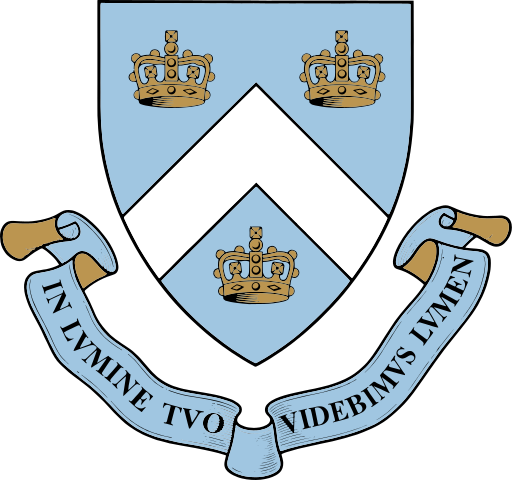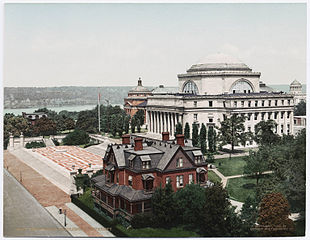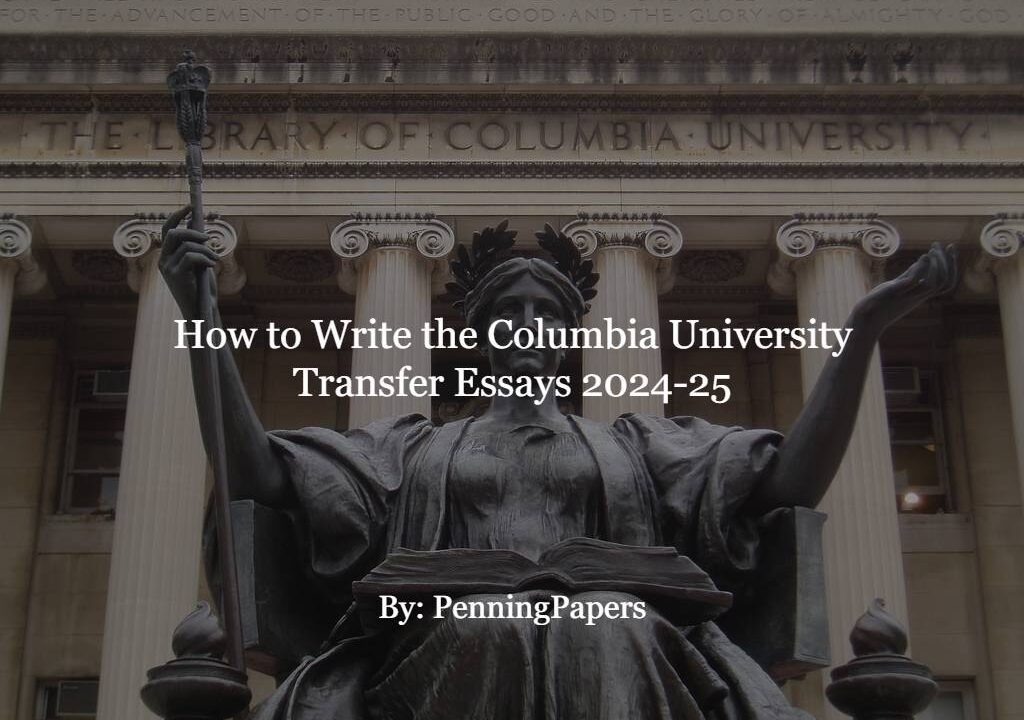Well, would you look at that: an aspiring Columbia student looking to transfer!
As you can probably already tell, writing a set of solid Columbia University transfer essays isn’t easy. For one, you’re applying to an Ivy League school, which means you’re competing against many other smart students. Additionally, standing out with solid essays is much harder when you’re fighting tooth and nail for a spot against other smart students.
Ouch.
And, just to pour salt in the wound, check this out: Columbia typically admits “fewer than 10 percent of the applicants for transfer admission each year.”
If you want to beat these odds, you’ll need a solid set of essays. And, that’s what we’re here to help you with. In this article, we’ll be covering each of the Columbia University transfer essays and their prompts. By the end of this, you should be capable of writing solid responses to each prompt that cut through the competition like butter.
Oh yeah, and don’t forget: the Columbia transfer application is due March 1.
Now, without further ado, let’s spread that butter… or, whatever analogy works in this case.
Table of Contents
- Columbia University Transfer Essays Prompts
- How to Answer the “Why Transfer to Columbia” Prompt.
- How to Answer the “Words or Phrases That Describe Your Ideal College” Prompt.
- How to Answer the Columbia List of Intellectual Development Prompt.
- How to Answer the Columbia Short Answer Prompts.
- How to Answer the “Why do You Value Columbia” Prompt.
Professional College Application Help.
Contact us. We'll get to you within 24 hours.
Columbia University Transfer Essays Prompts

How to Answer the “Why Transfer to Columbia” Prompt.

“Please note: While the Coalition Essay in the Application Profile is not required for a complete transfer application, applicants will be asked to upload a 400-600 word essay on the Columbia Supplement to the Coalition Application responding to the following prompt in the Uploads section of the application:
Please explain why you are interested in transferring from your current institution. (The personal essay does not need to be specific to Columbia, but it should inform the committee why you wish to leave your current institution.)“
Columbia University Main Transfer Essay Prompt 2024
The 400-600 word count recommendation is very slim. This doesn’t give you a lot of space to write.
So, if you want to be efficient, you’ll need to include as much information in as few words as possible.
Because this essay is very similar to the final 300-word “Why Do You Value Columbia” prompt, it’s better to talk more about why you need to transfer in this prompt. That is, don’t make this a “Why Columbia” essay. Save that for the final prompt.
We recommend having a narrative format for this prompt.
Here’s a general path you should follow.
- Your passion or academic major.
- Why is this major important to you?
- Why are you passionate about it?
- What is your career/non-profit/startup/job plan for this field in the future?
- Why your current institution is NOT enough to fulfill this goal?
- How attending a better school (such as Columbia) would help you fulfill this important goal.
By following this general structure, you should have a more organized essay that takes readers through your journey from beginning to end. Additionally, you can show admissions officers you have a very good reason to transfer out of your school. And, you show promise by connecting your career or potential startup project with Columbia.
Remember: 600 words is not a lot. To fit within the word count, we recommend you write out EVERYTHING first BEFORE you reduce and cut down. This makes the editing and writing process much easier than expected.
How to Answer the “Words or Phrases That Describe Your Ideal College” Prompt.

“List a few words or phrases that describe your ideal college community. (150 words or less)”
Columbia University Words or Phrases Prompt
Okay, we know what you’re thinking:
“I’ll just look up what kind of college Columbia University is like, and explain that!”
Very clever.
But, you should also recognize that by doing this you’ll be effectively doing what every other student applying to Columbia is. Additionally, you’re not really using the space to show more about you and your character. You’re really just showing that you want to go to Columbia, which the admissions officers already know since you’re sending an application.
Don’t forget: the Columbia University transfer essays aren’t like other college essays. You need to really stand out if you want a solid shot at acceptance.
Now, that doesn’t mean don’t do any research into Columbia at all. If anything, you should look up what the student body is like and the work professors are doing. But, don’t forget: showing your ideal college doesn’t need to be limited to realistic answers. You can get creative.
For instance, you can explain your ideal college as being “interdisciplinary and appreciative of art and literature, even Tolstoy’s 1,352 pages.”
Introducing quirkiness or interesting answers in this way lets AOs learn more about you and not just the fact that you want to go to Columbia. Thus, your essay can be much more than just stroking the school’s ego.
How to Answer the Columbia List of Intellectual Development Prompt.

For the list question that follows, there is a 100 word maximum. Please refer to the below guidance when answering this question:
- Your response should be a list of items separated by commas or semicolons.
- Items do not have to be numbered or in any specific order.
- It is not necessary to italicize or underline titles of books or other publications.
- No author names, subtitles or explanatory remarks are needed.
List a selection of texts, resources and outlets that have contributed to your intellectual development outside of academic courses, including but not limited to books, journals, websites, podcasts, essays, plays, presentations, videos, museums and other content that you enjoy. (100 words or fewer)
Columbia University Transfer List Prompts 2024
The key point here is “intellectual development.” So, you need to make sure you are writing about things that actually help in your intellectual journey. These can be academic in nature; or, they can also be outside your intended major. Additionally, these items can be considered both intellectual and entertaining.
For instance, YouTube channels you follow that cover fashion design and fashion principles can still be considered part of your intellectual development even if they’re not directly aligned with your major. Podcasts and videos about video game design, lore, and critique can also fall under this category.
Now, certain things like playing games or watching TV shows with not much intellectual value won’t work. So, shows such as Rick and Morty don’t count.
As a general rule: “intellectual development” should involve any kind of activity that demands some level of mental processing. It shouldn’t be complete instant gratification.
We’ve provided some examples of good items that are still “fun” without being completely irrelevant below.
- Fear and Hunger’s Grueling Mythology.
- How Elden Ring Balances Darkness with Beauty
- Hidetaka Miyazaki on Game Design
- MYTH BUSTED! Everyone Was Dirty & No One Washed “Back Then” (Ft. Historian Hilary Davidson)
- CGP Grey’s Podcast Series
Most importantly, don’t be afraid to be honest about your interests here. It’s common for students to inflate their topics to make them sound smarter than they really need to be. This essay should NOT be about forcing the admissions officers into thinking you’re super smart. If anything, you should prioritize honesty and openness.
Remember: the admissions officers are also screening you on how genuine you sound. So, honesty is worth its weight in gold.
How to Answer the Columbia Short Answer Prompts.

Below we’ve pasted Columbia’s 4 short answer prompts.
We’ll be deconstructing and discussing how to answer each one below. Also note: just because these prompts are short does not mean you shouldn’t take them seriously. These are still important parts of the Columbia University transfer essays.
- A hallmark of the Columbia experience is being able to learn and thrive in an equitable and inclusive community with a wide range of perspectives. Tell us about an aspect of your own perspective, viewpoint or lived experience that is important to you, and describe how it has shaped the way you would learn from and contribute to Columbia’s diverse and collaborative community. (150 words or fewer)
- The important thing here is to remember that diversity of ideas and backgrounds is an ASSET. This isn’t just a “feel good” idea as most people think. For, there is power in diversity.
So, when answering this prompt, try to talk about a personal experience that involves you engaging in active listening.
(By the way: Verywellmind had a great article explaining active listening which you can check out here.)
This means paying attention to what people say (whether you agree or disagree) and being capable of engaging and wrestling with their ideas. More importantly, you should be able to extract important themes, ideas, and motifs from other people’s perspectives and demonstrate that you can understand them well. This shows a level of empathy, compassion, and depth of thought that is crucial to the Columbia University essay.
And, funnily enough, this actually makes the essay less about you and more about your ability to engage with other people’s perspectives. For, your ability to empathize and articulate ideas with others will demonstrate your fit with the school’s diverse community. The last thing you want to do in this instance is actually make it all about you!
- The important thing here is to remember that diversity of ideas and backgrounds is an ASSET. This isn’t just a “feel good” idea as most people think. For, there is power in diversity.
- In college/university, students are often challenged in ways that they could not predict or anticipate. It is important to us, therefore, to understand an applicant’s ability to navigate through adversity. Please describe a barrier or obstacle you have faced and discuss the personal qualities, skills or insights you have developed as a result. (150 words or fewer)
- In this prompt, your goal is to articulate the problems and adversities you faced in a manner that stands out from the rest. Remember: most people are going to talk about how hard work helped them get through trying times. It’s your job to write about something special and unique in a manner that would blow the rest of the application pool out of the water.
The best way of doing this is to show how you have a more profound understanding of the way you navigate adversity. Maybe your solution is more sophisticated than just brute-force hard work. Or, you have a more elaborate way of explaining how you overcome anxiety from a psychological perspective.
Whatever way you write this, make sure it’s profound, deep, and written in a way that’s deeper than surface-level platitudes.
In other words, try not to sound like a Live, Laugh, Love poster or a motivational quote calendar.
Okay. Here’s an example: overcoming perfectionism and the inability to start anything because of it.
Most people may say the path to overcoming perfectionism is to “just accept imperfection.” But, that’s quite a simplistic solution without any real substance. Instead, you can make a fantastic and interesting essay by making it about how you came to purposefully fail, which inexorably helped you overcome the fear of failure. Maybe you kicked the ball in the opposite direction. Or, you fell into a pit of lava in the Mario game. The exposure to failure allowed you to get desensitized to falling short of perfection. And, this desensitization has helped you overcome the fear of getting started because you no longer feel the overwhelming pressure of having to start a project with perfect marks.
An explanation like this would allow admissions officers to understand your journey on a more personal level instead of just “getting over it” or “hard work.” Remember: you need to be as specific as possible about how you got to your journey rather than just keeping it vague.
- In this prompt, your goal is to articulate the problems and adversities you faced in a manner that stands out from the rest. Remember: most people are going to talk about how hard work helped them get through trying times. It’s your job to write about something special and unique in a manner that would blow the rest of the application pool out of the water.
- Why are you interested in attending Columbia University? We encourage you to consider the aspect(s) that you find unique and compelling about Columbia. (150 words or fewer)
- This is like any other “Why Us” essay. But, don’t underestimate the importance of this prompt.
Note that this prompt requires you to write what you think is unique and interesting about Columbia in 150 words or fewer. So, you won’t get much space to talk about EVERYTHING you like about Columbia.
Dedicate this small word count to 1-2 things about Columbia that you think would greatly benefit your learning experience. This can include your future major or career, research projects you’d like to conduct, environment or personal social goals, etc. But, remember to be specific about this. It should be very obvious within your 150 words that Columbia is a smart choice for you to pick.
The best way of thinking about this is as a financial proposal. Imagine yourself as an asset. The university wants to see why investing both time and money in their school would yield positive results in your life. If they read your statement, would it make personal and fiscal sense? If so, then great! If not, consider where your writing is falling short. Chances are, it’s being too vague and obscure about why Columbia would benefit you. Remember to keep it succinct and accurate; but, also believable.
- This is like any other “Why Us” essay. But, don’t underestimate the importance of this prompt.
- What attracts you to your preferred areas of study at Columbia College or Columbia Engineering? (150 words or fewer)
- This is a bit similar to the “Why Colbumia” vein.
Ultimately, this prompt should be focused on the class content, professors, research opportunities, and how it may benefit your future career.
Again, try to be very specific with this. You should imagine this short essay as a set plan that includes how the resources at Columbia would actually help you. The writing should be transparent enough that you can understand how the resources actually propel you forward in your major or career.
You don’t even need to be limited to any kind of job or career in the future. You can write about startup ideas or plans you would like to execute at Columbia and how the classes, professors, or research opportunities available would help you in bootstrapping these plans.
Whatever it is you plan to write here, avoid being vague. Vagueness only shows that you don’t truly understand how Columbia would actually benefit your future plans. Keeping things specific does.
- This is a bit similar to the “Why Colbumia” vein.
How to Answer the “Why do You Value Columbia” Prompt.

“Please tell us what you value most about Columbia and Why.”
(300 words or less)
Columbia University Why do you Value Columbia Prompt
One of the biggest mistakes people make with this question (and perhaps the rest of the Columbia University transfer essays, but this one especially) is in their sense of control.
Sounds a bit unusual, right? Let’s explore this concept further.
When students are prompted with a question along the lines of “Why do you like x school?” they get very agitated. There’s a severe reaction of “what can I say to MAKE admissions officers like what I say?” It’s always about MAKING admissions officers enjoy the writing.
However, this is a pathological place to start. You don’t want to start from a position of needing to CONTROL what admissions officers think about you. All you’ll do is end up sounding awkward and more importantly inorganic. Admissions officers read a lot of college essays. A lot of them. They can distinguish between the genuine ones and the disingenuous ones.
Be very honest here in this process. Don’t mention anything in the “Why do you Value Columbia essay” unless you REALLY understand why it would benefit you. If there are clubs and activities you’re not too familiar with, don’t mention them. If there are certain classes only somewhat related to you but you can’t draw too many connections with them, don’t write about them. The key here is to be open, honest, and have nothing up your sleeves.
Even if you mention just one thing you value about Columbia, it will be stronger than a lot of other essays as long as it sounds genuine and honest. Remember: the admissions office receives countless applications. Their job is to sort between the people who truly want to attend and the ones who put Columbia on their application list last minute. Showing passion and intent to attend can be hard. But, if you are genuine and truthful, your passion will bleed through the writing.
Of course, some students struggle with writing more than others. We often find that students writing their Columbia University transfer essays as Engineering or STEM majors have a particularly difficult time articulating their thoughts in the essays. If that seems to apply to you (or if you’re any other major and still struggle with writing the Columbia essays) don’t be afraid to seek help.
Here at PenningPapers, we’ve helped countless students get accepted into the Ivy League. Simply schedule a free consultation with us, and we’ll get back to you within 24 hours!

